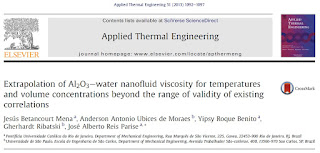The emergence of nanofluids as an attractive new class of thermal fluids, with enhanced heat transfer characteristics, rapidly stimulated their use in engineering applications. It also led to the need of an intensive experimental work to determine the thermophysical properties of nanofluids affecting heat transfer such as density, viscosity, thermal conductivity and specific heat capacity. Contradictory results were obtained by several researchers for the dependence of the nanofluid viscosity on temperature, nanoparticle diameter and nanoparticle volume concentration. In regard to these variables, a summarizing work was presented by Khanafer and Vafai (2011) who successfully presented a quite general correlation for the effective viscosity of Al2O3-water nanofluid with temperature ranging from 20 to 70 C, nanoparticle volume concentration between 1 and 9 vol%, and nanoparticle diameter between 13 and 131 nm. The present work presents a methodology for extrapolating this correlation beyond its range of validity, as a first attempt to obtain an approximate expression to systematically evaluate the viscosity of Al2O3ewater in simulation of heat transfer applications for the range of temperatures from 5 to 20 C and nanoparticle volume fractions below 1 vol%. New experimental data was obtained for the viscosity of Al2O3ewater nanofluid within this range of low temperature and volume fraction, showing good agreement with most of the corresponding extrapolation values.
Parabéns!!


Nenhum comentário:
Postar um comentário